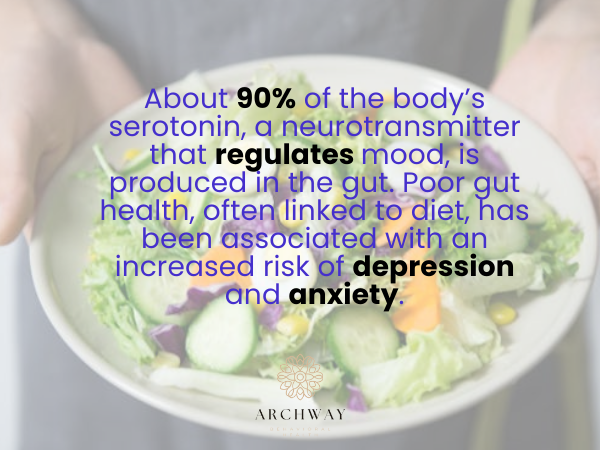The connection between physical health and mental health is undeniable, yet one of the most overlooked aspects of mental well-being is nutrition. The food we consume directly impacts brain function, mood regulation, and overall emotional stability. For individuals navigating mental health challenges or recovering from addiction, proper nutrition can significantly enhance the effectiveness of treatment, including Individual Therapy, Group Therapy, and structured programs like Partial Hospitalization Programs (PHP) and Intensive Outpatient Programs (IOP).
This blog explores the essential role of nutrition in supporting mental health, its impact on recovery, and how it complements evidence-based therapies
The Connection Between Nutrition and Mental Health
The link between nutrition and mental health is rooted in the brain’s dependence on nutrients to produce neurotransmitters, regulate hormones, and reduce inflammation. Poor dietary habits can disrupt these processes, contributing to the onset or worsening of mental health conditions.
Key Nutritional Components Supporting Mental Health
- Omega-3 Fatty Acids
- Found in salmon, walnuts, flaxseeds, and chia seeds, omega-3s are essential for brain health.
- They reduce inflammation, enhance neuron communication, and support the production of serotonin and dopamine, key neurotransmitters that regulate mood.
- B Vitamins
- Vitamins like B6, B12, and folate are critical for neurotransmitter production and brain function.
- Deficiencies are linked to increased risk of depression, cognitive decline, and fatigue. Foods like leafy greens, eggs, and fortified cereals are excellent sources.
- Magnesium
- Found in almonds, spinach, and avocados, magnesium helps manage stress and anxiety by regulating cortisol levels.
- It also supports sleep and relaxation, which are critical for mental health.
- Complex Carbohydrates
- Whole grains, fruits, and vegetables provide steady glucose levels for the brain, preventing mood swings and fatigue.
- These foods also contribute to the production of serotonin, enhancing emotional stability.
- Probiotics and Prebiotics
- Probiotic-rich foods like yogurt, kimchi, and kefir promote a healthy gut microbiome, which influences the production of serotonin and reduces inflammation.
- Prebiotics, found in garlic, bananas, and onions, feed beneficial gut bacteria, supporting the gut-brain connection.
- Antioxidants
- Brightly colored fruits and vegetables like berries, oranges, and carrots combat oxidative stress, which has been linked to mental health disorders such as anxiety and depression.
The Impact of Poor Nutrition on Mental Health
When nutritional needs are neglected, the effects on mental health can be profound. Poor nutrition contributes to:
- Increased Risk of Depression and Anxiety: Diets high in processed foods, added sugars, and unhealthy fats are associated with higher rates of mental health disorders.
- Impaired Cognitive Function: Lack of essential nutrients can affect memory, focus, and decision-making.
- Mood Instability: Irregular eating patterns and unbalanced diets can cause blood sugar fluctuations, leading to irritability and emotional outbursts.
- Sleep Disorders: A poor diet disrupts the production of melatonin, affecting sleep quality and increasing fatigue.
The Role of Nutrition in Reducing Stress and Anxiety
Stress and anxiety are natural responses to life’s challenges, but chronic stress can deplete the body’s resources and worsen mental health. Proper nutrition can mitigate these effects by supporting the body’s stress response and stabilizing mood.
Nutrients That Reduce Stress and Anxiety:
- Magnesium:
- Reduces the release of cortisol, the body’s primary stress hormone.
- Foods like dark chocolate, leafy greens, and nuts are rich in magnesium.
- Complex Carbohydrates:
- Promote the production of serotonin by providing steady glucose levels for the brain.
- Found in whole grains, quinoa, and sweet potatoes.
- Herbal Teas:
- Chamomile and green tea contain natural compounds that promote relaxation and reduce stress.
- Omega-3 Fatty Acids:
- Reduce inflammation and support healthy brain function, lowering anxiety levels.
- Probiotics:
- Improve gut health, which is closely linked to stress management through the gut-brain axis.
How Nutrition Reduces Anxiety Symptoms:
- Stabilizes blood sugar levels, preventing energy crashes that can exacerbate feelings of panic or worry.
- Supports neurotransmitter production, promoting a sense of calm and focus.
- Reduces inflammation, which is often associated with chronic stress.
Nutrition’s Role in Specific Mental Health Treatments
Integrating nutrition into comprehensive treatment programs enhances the effectiveness of therapies like CBT and DBT, helping individuals achieve sustainable mental health improvements.
Cognitive Behavioral Therapy (CBT):
- Proper nutrition supports cognitive function, enabling individuals to process thoughts clearly and challenge negative thinking patterns more effectively.
- A balanced diet stabilizes mood, allowing individuals to engage fully in therapy.
Dialectical Behavior Therapy (DBT):
- Nutrition reduces emotional reactivity, enhancing distress tolerance and mindfulness practices central to DBT.
- Nutrient-rich foods improve the body’s stress response, complementing DBT techniques for emotional regulation.
The Relationship Between Nutrition and Sleep Quality
Sleep and mental health are deeply interconnected, and nutrition plays a key role in regulating sleep patterns. A poor diet can disrupt sleep cycles, while proper nutrition promotes restful and restorative sleep.
Nutrients for Better Sleep:
- Magnesium:
- Supports relaxation by regulating melatonin, the hormone that controls sleep cycles.
- Found in spinach, almonds, and pumpkin seeds.
- Tryptophan:
- An amino acid that the body converts into serotonin and melatonin, promoting relaxation and sleep.
- Found in turkey, eggs, and dairy products.
- Vitamin D:
- Regulates melatonin production and is essential for maintaining a healthy circadian rhythm.
- Sources include fortified dairy, fatty fish, and sunlight.
- Calcium:
- Supports the brain’s use of tryptophan to produce melatonin.
- Found in dairy products, broccoli, and kale.
Foods to Avoid for Better Sleep:
- Caffeine: Stimulates the nervous system, making it harder to fall asleep.
- Refined Sugars: Cause energy spikes and crashes, disrupting sleep cycles.
- Alcohol: Interferes with REM sleep, reducing the quality of rest.
Nutrition in Structured Programs
Partial Hospitalization Program (PHP):
- PHPs often include nutritional counseling as part of the daily schedule, ensuring individuals receive consistent support to rebuild physical and mental health.
- Balanced meals and educational workshops provide tools for long-term dietary changes.
Intensive Outpatient Program (IOP):
- IOPs empower individuals to integrate healthy eating habits into their daily lives while maintaining flexibility in treatment.
- Group therapy sessions may include discussions on the role of nutrition in emotional regulation and relapse prevention.
Anxiety and Depression Treatment Programs:
- Proper nutrition directly impacts symptoms of anxiety and depression. For instance:
- Omega-3 fatty acids reduce inflammation linked to depression.
- Magnesium and B vitamins alleviate stress and improve mood.
The Gut-Brain Connection
The gut-brain axis highlights the profound relationship between gut health and mental health. The gut is often referred to as the “second brain” because of its influence on neurotransmitter production and stress regulation.
- Neurotransmitter Production:
- About 90% of serotonin, the “feel-good” neurotransmitter, is produced in the gut. A healthy diet rich in fiber and probiotics supports this process.
- Inflammation Reduction:
- Poor gut health can cause inflammation that affects the brain, contributing to anxiety and depression. Nutrient-rich, anti-inflammatory foods can reduce these effects.
- Stress Regulation:
- A balanced gut microbiome improves the body’s resilience to stress, helping regulate mood and emotions.
How Poor Nutrition Contributes to Mental Health Challenges
Poor dietary habits can have a detrimental impact on mental health, exacerbating symptoms of anxiety, depression, and cognitive decline. Diets high in processed foods, added sugars, and unhealthy fats create imbalances in the brain and body.
Effects of Poor Nutrition on Mental Health:
- Blood Sugar Instability:
- Irregular eating patterns or diets high in refined sugars cause energy crashes and mood swings.
- This can lead to irritability, fatigue, and increased anxiety.
- Nutrient Deficiencies:
- A lack of essential nutrients like omega-3s, magnesium, and B vitamins impairs neurotransmitter production, contributing to depression and anxiety.
- Increased Inflammation:
- Processed and high-fat diets promote inflammation, which is linked to depression and cognitive impairment.
- Gut Microbiome Imbalance:
- Diets low in fiber and probiotics harm gut bacteria, reducing serotonin production and worsening mood disorders.
Integrating Nutrition at a Mental Health Treatment Center
At a Mental Health Treatment Center, nutritional support is an essential component of holistic care. Tailored nutrition plans, educational workshops, and practical tools are integrated into treatment to address both physical and mental well-being.
1. Individualized Nutrition Plans:
- These plans consider individual medical histories, mental health conditions, and personal preferences to create sustainable dietary changes.
2. Group Therapy and Nutritional Education:
- Group therapy sessions may include education on how diet impacts mental health, offering practical tips for meal planning and grocery shopping.
3. Long-Term Support in PHP and IOP:
- PHPs provide consistent access to balanced meals, while IOPs help individuals implement dietary habits in real-world settings.
Long-Term Benefits of Nutrition for Recovery
Integrating proper nutrition into mental health and addiction recovery provides lasting benefits, not only for emotional well-being but also for physical health and overall quality of life.
Benefits of a Balanced Diet for Recovery:
- Enhanced Emotional Stability:
- Consistent nutrient intake reduces mood swings and promotes emotional regulation.
- Improved Cognitive Function:
- Omega-3s and antioxidants protect brain cells, enhancing memory, focus, and problem-solving skills.
- Stronger Stress Resilience:
- Magnesium, probiotics, and complex carbohydrates help regulate cortisol levels, improving the body’s response to stress.
- Reduced Relapse Risk:
- A healthy diet minimizes cravings, boosts energy, and reduces reliance on unhealthy coping mechanisms.
- Physical Health Restoration:
- Proper nutrition repairs damage caused by poor dietary habits or substance abuse, improving immunity, energy levels, and overall health.
Long-Term Benefits of Nutrition for Mental Health
Proper nutrition supports long-term mental health recovery by:
- Enhancing Emotional Stability: Balanced diets reduce mood swings and improve resilience.
- Boosting Cognitive Function: Improved focus and memory aid in decision-making and problem-solving.
- Reducing Relapse Risk: Stable energy and blood sugar levels decrease cravings and the likelihood of relapse.
- Supporting Overall Health: Improved sleep, energy, and physical health contribute to a stronger foundation for mental well-being.
Conclusion
Nutrition is a powerful, yet often underutilized, tool in mental health and addiction recovery. By providing the brain and body with the nutrients they need, individuals can enhance the effectiveness of therapies like CBT and DBT, improve emotional regulation, and build resilience against future challenges.
At a Mental Health Treatment Center, integrating nutrition into comprehensive care—alongside programs like PHP, IOP, and therapy—creates a holistic path to healing. Nutrition doesn’t just fuel the body; it nurtures the mind, laying the foundation for lasting recovery and mental health stability. Take the step toward reclaiming your life and health—contact us at (888) 488-4103.
Frequently Asked Questions (FAQ)
How does nutrition affect mental health?
Nutrition directly impacts brain chemistry, mood regulation, and overall emotional stability. Nutrients like omega-3 fatty acids, B vitamins, and magnesium are essential for neurotransmitter production, which influences mood and stress levels. A balanced diet promotes mental well-being, while poor nutrition can contribute to anxiety, depression, and cognitive impairment.
What is the gut-brain connection, and why is it important?
The gut-brain connection refers to the communication between the gastrointestinal system and the brain. The gut produces about 90% of the body’s serotonin, a key neurotransmitter for mood regulation. A healthy gut, supported by probiotics and fiber-rich foods, helps reduce inflammation and improve emotional resilience.
Can diet help reduce symptoms of anxiety and depression?
Yes, a healthy diet can alleviate symptoms of anxiety and depression. Foods rich in omega-3s, magnesium, and antioxidants help regulate mood and reduce inflammation, while complex carbohydrates stabilize blood sugar levels to prevent mood swings.
What foods should I avoid for better mental health?
To support mental health, avoid processed foods, refined sugars, trans fats, and excessive caffeine or alcohol. These foods can disrupt neurotransmitter production, cause inflammation, and lead to mood instability.



